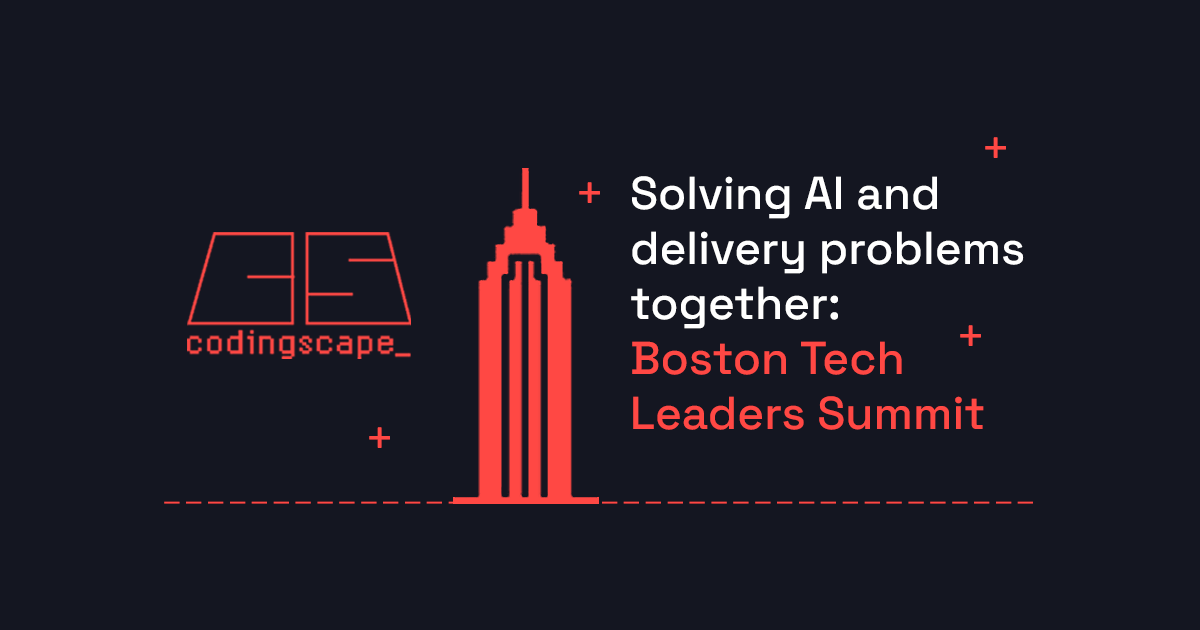Solving AI and delivery problems together: Boston Tech Leaders Summit
Read Time 4 mins | Written by: Cole

Boston's top product and engineering leaders walked into our Tech Leaders Summit carrying familiar burdens.
Despite talented teams from companies like Reddit, Microsoft, and Chewy.com, they were wrestling with the same persistent challenges: AI initiatives stalling, delivery timelines stretching, and processes that slow innovation rather than accelerate it.
Three hours later, these leaders left with a shared revelation that would reshape how they approach both technology adoption and team dynamics.
The breakthrough wasn't about finding better tools or processes – it was about finally seeing the human patterns that make or break every initiative.
Two types of process problems killing momentum
One of the evening's most illuminating moments came when participants analyzed their biggest process complaints. What emerged were two distinct categories that every leader in the room recognized:
Category 1: The "annoying but unavoidable" – paperwork, delays, and the classic problem of people claiming readiness when they're clearly not prepared. These friction points feel inevitable, but they compound into serious delivery bottlenecks.
Category 2: The "fixable with context" – processes that could work well if people understood the "why" behind them. Issues like budget transparency, innovation constraints, and well-intentioned procedures that fail due to flawed process design.
This distinction proved crucial. While the first category requires acceptance and workarounds, the second category represents massive opportunity for improvement through better communication and clarity.
When "lazy" people reveal broken systems
Eli, a product manager from the sustainability tech space, tackled what many consider the most sensitive topic: people problems. His findings cut straight to the core of why smart teams struggle with change.
"People are lazy and bad at communicating," he observed – but his analysis went deeper. The "laziness" manifested in two specific ways: reluctance to take on new tasks and resistance to implementing changes, even when current processes are clearly broken.
The communication failures were equally revealing: people not asking questions, not engaging with available resources, and not taking advantage of training materials that teams spend significant time creating.
Eli's example resonated with every leader present: "With every new product release, we'd create tutorial videos, FAQ documents, and deliver internal trainings. Then invariably, three months later, salespeople would come asking for tutorials on the same product they were already selling to customers."
This pattern exposed a fundamental truth: what looks like individual laziness is often a symptom of systemic communication breakdown.
The AI adoption parallel: technical solutions, human problems

These insights proved especially relevant for leaders implementing AI initiatives. The same patterns that derail process improvements also sabotage AI adoption – people avoiding new workflows, failing to engage with training resources, and continuing old methods even when better tools are available.
One attendee from a major tech company realized their stalled AI implementation wasn't failing due to technical complexity. Their team had the capabilities and tools, but people weren't adopting them because the communication strategy treated AI as a technical deployment rather than a human change management challenge.
The solution wasn't more sophisticated AI tools – it was addressing the "why" behind adoption and creating clearer pathways for people to engage with new capabilities.
Beyond individual blame: system-level solutions

The evening's discussions revealed that most "people problems" are actually "system problems" in disguise. When teams consistently struggle with the same behaviors – avoiding training, resisting change, poor communication – the issue isn't individual character flaws, it's inadequate system design.
Leaders began identifying specific interventions:
For the "annoying but unavoidable" problems: Building these friction points into project timelines rather than treating them as unexpected delays, and creating standardized workarounds that teams can execute efficiently.
For the "fixable with context" problems: Investing in the "why" communication upfront, making budget and decision-making processes more transparent, and redesigning well-intentioned processes that aren't delivering their intended outcomes.
For AI and technology adoption: Treating implementation as a change management challenge first, with technical deployment as the supporting element rather than the primary focus.
What made this Boston Tech Leaders Summit work

The intimate, discussion-based format allowed leaders to move beyond surface-level complaints to root cause analysis. Instead of networking small talk, participants engaged in structured problem-solving that yielded immediately applicable insights.
The diversity of companies represented – from established tech giants to innovative startups – created a rich exchange of perspectives on common challenges. What became clear is that these delivery and adoption problems transcend company size, industry focus, or technical sophistication.
These Boston tech leaders are now equipped to address delivery and AI adoption challenges at their source: the human dynamics that technical solutions can't solve. They're moving beyond individual blame to system-level thinking, beyond tool selection to change management strategy.
The breakthrough isn't in working harder on technical implementation – it's in working smarter on the human elements that determine whether any initiative succeeds or fails.
Ready to solve delivery and AI problems with other tech leaders?
Join the waitlist for future Tech Leaders Summit events in your city and be the first to know when we're gathering again. Connect with fellow product and engineering leaders who are passionate about building better products faster and putting customers at the center of everything they do.
Whether you're modernizing your tech stack, implementing AI, or simply staying ahead of the innovation curve, you'll find kindred spirits committed to solving the real problems that hold great teams back.
Don't Miss
Another Update
new content is published

Cole
Cole is Codingscape's Content Marketing Strategist & Copywriter.
